Utah Biographies ~ Caine to Cutler
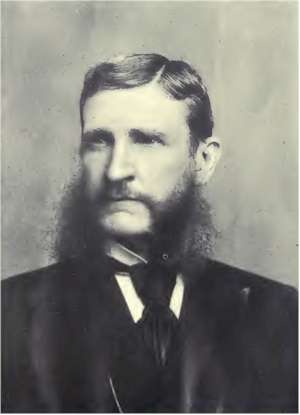
Caine, John T. Hon.
John Thomas Caine was born in the
parish of Kirk Patrick, Isle of Man, on January 8, 1829. When
but six years of age he was virtually an orphan, his father
having immigrated to America, his mother being dead, and having
no brothers or sisters. He was taken into the home of Hugh
Cubbon, his grandfather. Later he went to live with an aunt,
Mrs. William Cowley, who took a motherly interest in the little
fellow and sent him to school.
At an early age he was urged to obtain some knowledge of the
tailor's trade, with a view of fitting himself to take a
position in an uncle's merchant tailoring establishment. This
work did not appeal to him, and, being ambitious to seek his
fortune in America, he laid his plans accordingly. An
opportunity to gratify his desire came in the form of a small
sum of money, left him by his grandfather, and he sailed for
America in 1846.
His knowledge of the tailoring business stood him in good stead
upon his arrival in New York, and he was thus enabled to earn a
livelihood without difficulty. It was while in New York that he
embraced the Mormon religion and became an active worker in that
faith.
In 1850 Mr. Caine married Margaret Nightingale, and two years
later found the Caine family in Salt Lake City, Utah, where he
employed various ways of earning a livelihood, chiefly that of
teaching school. He was called upon a mission to the Hawaiian
Islands, where he remained for over two years.
Soon after his arrival in Salt Lake City, Mr. Caine became a
member of the original Deseret Dramatic Association, and later
was one of the prime movers in the building of the Salt Lake
Theatre.
John T. Caine has the distinction of having represented
Utah in the Congress of the United States by a longer period
than any other man. He was first elected to the Forty-seventh
Congress as successor to George Q. Cannon, whose seat had been
denied. He was thereafter elected as Territorial representative
to the 48th, 49th, 50th, 51st, and 52nd Congresses. He was
immensely popular with the people of Utah, and his services in
Congress were highly satisfactory to them. He was afterwards
very prominent and influential in securing the admission of Utah
as a State.
On September 5, 1895, Mr. Caine was unanimously nominated for
the first governor of the State of Utah, on the Democratic
ticket, which ticket, however, was defeated. In 1896 he was
carried to victory for State Senator on the same ticket.
Mr. Caine is the father of thirteen children. Though a public
man, whose duties have kept him from home a great deal of the
time, Mr. Caine is a lover of his home and devotedly attached to
his wife and children.
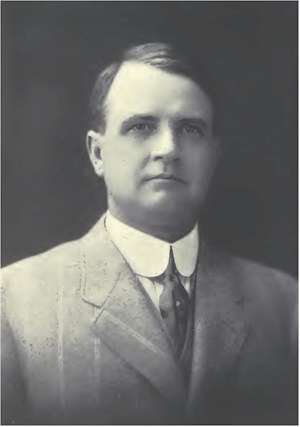
Caine, Joseph E.
The Western type, with the buoyant air and hustling, though
self-contained manner, cannot be more thoroughly exemplified
than in the person of Joseph E. Caine, of Salt Lake City. Born
and raised in the City of Zion, he has seen the town in which he
first saw the light of day, advance with wondrous strides, and
more than that he has been instrumental in making it what it is
today.
Mr. Caine was born April 16, 1864, he being the son of Hon. John
T. Caine and Margaret Nightingale Caine. His father was one of
the pioneers of this country and was at one time delegate to
Congress. Mr. Game's education was varied and complete. He
attended first the University of Utah, and while there acquitted
himself very creditably, his scholarship being of a very high
standard. After completing his course of instruction here he
attended the Maryland Agricultural College, after which he was a
student at the United States Military Academy at West Point, New
York.
Coming west to his home, Mr. Caine immediately upon his arrival
took up newspaper work and spent some time on the "Tribune,"
"Democrat" and "Herald." That he was a success in that
profession is attested by all who know him and were in the city
during this period in his life. When the sound of drums and
martial music was heard, in 1898, and the call for volunteers
resounded on every side, the love for his country and patriotic
fire, burning deep into his soul, could not be quieted, and,
leaving his chosen profession, he went to the front. He served
as captain of the First Troop Utah United States Volunteer
Cavalry. This troop played a prominent part in the war, and many
times it has been said officially that the troop of which Mr.
Caine was the captain was the finest troop of one hundred men in
the United States Army.
After the war was over, Mr. Caine decided that he would branch
out a little and not go into the newspaper game again. He became
identified with several mining properties, and he has been
uniformly successful in all his mining operations. His knowledge
of this industry he gained through his varied experience through
this country and he is recognized today by the mining men in the
inter-mountain country as being keen and far-sighted, but always
honest and manly in his dealings.
Mr. Caine's domestic life is a very happy one. He was married
November 26, 1888, to Miss Annie Hooper, daughter of Captain
William H. Hooper, former delegate to Congress. The union has
been a most happy one and has been blessed with four children:
William Hooper, Joseph Nightingale, Robert Warrack and Hooper
Caine. The home life is ideal and the beautiful residence at 67
B Street is frequently the scene of parties and entertainments
where the many friends gather in a social way.
Mr. Caine at the present time is vice-president and manager of
the Yerington Copper Company, and also of the Wheeler Gold Mines
Company. He is also manager of the Caine & Hooper Company, which
is well known in this city. Although his many interests keep him
very busy, he has time to boost and work for the city in which
he was born. He is a member of the Board of Governors of the
Commercial Club, and is now serving his second term. Ever since
that organization was founded he has been one of the prime
movers in it, and that to-day it is one of the greatest
commercial organizations is a lasting tribute to Mr. Caine and
those who worked so hard with him for its success. He is also a
member of the University Club and the Press Club, and is an
active worker in both of these.
Politically Mr. Caine has not gained much prominence because he
never had much leaning that way. He was, however, at one time a
member of the Board of Public Works, and while in that office he
worked unceasingly and untiringly for improvements. Still a
young man, Mr. Caine has been very successful, and through his
manliness and integrity has earned an enviable reputation among
his fellowmen.
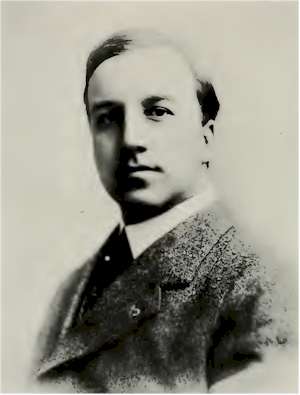
Catrow, Henry
Prominent in mining circles in the inter-mountain country and
especially in Utah is Henry Catrow, one of the youngest mine
operators in this country. Although he has been a resident of
the State but a few years, he has earned for himself an enviable
place among the min-ing men here. His connection with the Ohio
Copper Mine at Bingham and his success in handling this property
is well known to all conversant with the mining business in Utah
and elsewhere. The fact that this mine today is one of the
biggest propositions in the great camp of Bingham and will soon
be shipping a tremendous tonnage by virtue of the fact that a
campaign of development was waged by Mr. Catrow 's suggestion
will stand as a monument to his keenness and far-sightedness.
Born in Miamisburg, Ohio, on the 22nd of June, 1878, he received
his early education in the public schools of Miamisburg. He
afterwards attended the Pennsylvania Military College at
Chester, Pennsylvania, and finished his course at the University
of Michigan, graduating from the law department.
In June, 1903, after finishing his education he came to Salt
Lake City. Soon after his arrival here he became interested in
the Ohio Copper. He immediately started to promote the mine and
it has been truthfully said that he was the father of this big
proposition. He received the financial backing of Ohio
capitalists and the work on the property started in with new
vigor and vim. Although a couple of years ago F. Aug. Heinze
received control of the property, Mr. Catrow still was a large
shareholder and never ceased to interest himself in its
development. He has given his time and attention to its
development from the time when the Columbia tunnel .was being
worked on the Bingham side and the ore was being treated at the
Winamuck Mill to the present time when the big connection has
been made through the Mascotte tunnel and the Ohio Copper shaft,
and the erection of the huge 3000-ton mill at Lark. That this
mine will in a very short time be one of the great producers in
Bingham has always been Mr. Catrow's contention.
Mr. Catrow was married on the 7th of April, 1904, to Miss
Charlotte May Bettles, a well-known and prominent young lady of
this city. The union has been a most happy one and has been
blessed by two children, Alfred Newton and Henry Catrow, Jr.
While a man of domestic tastes, Mr. Catrow is identified with
several organizations, namely the University Club, Commercial
Club and is a thirty-second degree Mason. He bothers very little
with politics although he is always alive to the growth and
development of this city and State. Besides being a large
stockholder in the Ohio Copper he is interested in the Utah
Copper Company of Bingham.
Mr. Catrow is looked upon as one of the progressive young men in
the State and his many successes so far attest this to be a
fact.
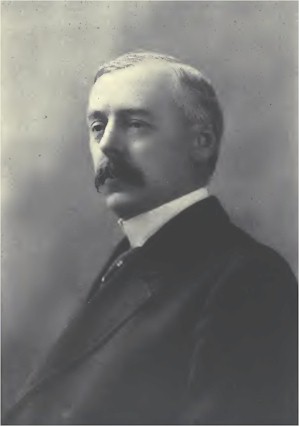
Clark, H. P.
Prominent in banking circles in Salt Lake City, and, in fact, in
the entire inter-mountain region, is Harry P. Clark, president
of the Merchants' Bank of Salt Lake City. Born in Cincinnati,
Ohio, on February 9, 1859, his father was Asa A. Clark, a
prominent newspaper man of that city, and his mother Elizabeth
Borton Clark. Mr. Clark received his earlier education in the
public schools of his native city and when yet a young man he
came West, locating in Kansas, and later settled in San
Francisco, where he became connected with the Bank of Wells,
Fargo & Company.
Seeing the possibilities afforded a young man in the
inter-mountain region, Mr. Clark came to Salt Lake City in June,
1903, as an officer of the Wells, Fargo & Company bank at this
place, remaining with them until they retired from the banking
business, when he accepted a position of prominence and trust
with the Commercial National Bank, now the Continental National
Bank, of which institution he was cashier until a short time
ago. In his connection of cashier of the Commercial National he
made a host of friends as a result of his good judgment and
conservative methods.
Under his efficient management the patronage of the bank grew to
splendid volume, and his success with the new institution will,
it is expected, be just as marked. Possessing to a marked degree
all the attributes of a successful business man, it is perhaps
not to be wondered at that Mr. Clark should have accomplished as
much as he has. Although he has devoted practically all his life
to the banking industry, he has also found leisure to interest
himself in the local real-estate situation. This, too, was a
promising field to Mr. Clark, and since coming to Salt Lake he
has become treasurer of the Fairmount Springs Realty Company,
and also of the Salt Lake Realty Company. He is treasurer of the
Green River Valley Land & Water Company, which controls 400,000
acres along the Green River and comprises one of the largest
irrigation projects within the State. He is vice-president of
the Bingham State Bank, in addition to being connected with
numerous other business and financial institutions in and around
Salt Lake City.
Mr. Clark is also quite prominent in local club life, being a
member of the Alta Club, the Commercial Club, and the Press
Club. He is a Free Mason, a member of the Wasatch Lodge, and a
member of the Utah Chapter, Utah Commandery, and El Kalah
Temple. He maintains a handsome residence at 303 South Seventh
East Street, where Mr. and Mrs. Clark frequently entertain.
Mr. Clark was married on May 28, 1884, his family consisting of
his wife, a son, Asa Alan Clark, and a daughter, Miss Florence
Margaret Clark. Personally, Mr. Clark is a man of genial
personality, whole-souled and generous to his friends. His
success in life up to this time has been gained through a strict
adherence to business principles and a rigid observance of the
ethics of commercial life. Possessed of a comfortable fortune
earned by his own industry, he will probably continue for many
years to be an active factor in his chosen walk of life. His
success is regarded merely as a logical outcome of well-directed
effort, and there are those who predict for him an even brighter
future.
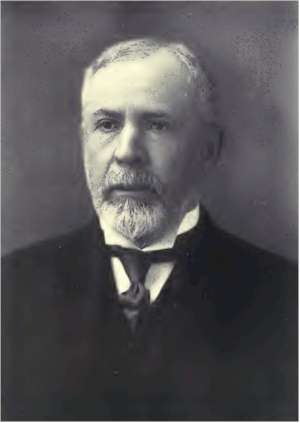
Cohn, Louis
Louis Colin, one of Salt Lake City's most progressive and
successful merchants, was born in Doberzyn, Poland, Russia,
April 18, 1842. He was educated in the Government public schools
there, and in 1859, at the age of seventeen, he emigrated to New
York, in which city he clerked in a dry goods store for two
years, when he went to California and entered the mercantile
business in Sierra County, where he kept a general store for the
next four years, in which he was quite successful. In 1865 he
left California, driving his own team from Poker Flat, made
famous by Bret Harte, and started for Salt Lake City, where he
arrived after a tedious six weeks' journey. Shortly after
arriving in Salt Lake he started a general store under the firm
name of Cohn & Munter, which continued for two years, when the
dry goods establishment known as The California Store was formed
by Mr. L. Colin and his brother, Alexander, which, after many
ups and downs, was finally merged into the Cohn Dry Goods
Company. That firm went out of business, and in 1887 the present
house was established and has been very successful ever since,
and is today one of the leading dry goods houses in Salt Lake
City. The success attained by this house was due mainly to the
business ability and good judgment of Mr. Louis Cohn, who
believes in sticking close to business and hanging on even when
severe reverses happen. He has always been a firm believer in
Salt Lake and the community and when he came here he determined
to stick, which he did and has made a success of his business.
His brother and partner, Mr. Alexander Cohn, died in 1902, and
the company was incorporated in 1907, and his widow retained her
husband's full share of the business.
Mr. Cohn, besides being president of the L. & A. Cohn Dry Goods
Company, is connected with the Kaysville Brick Company, and has
numerous mining interests. He was a member of the city council
for two terms during the administration of Mayor Scott, also in
1894, while Mayor Baskin held office, and was subsequently fire
and police com-missioner.
Mr. Cohn was married April 20, 1876, to Miss Carrie Lippman, and
they have two children, Edna C. and Sylvia Cohn Druehl. Mr.
Colin is a member of the Alta and Commercial clubs, a
thirty-second degree Mason and Shriner, and was grand master of
the Masonic fraternity in Utah in 1872.
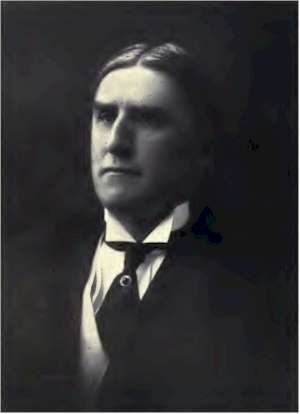
Critchlow, E. B.
Edward B. Critchlow was born October 2nd, 1858, in Warren
County, Mississippi, his father being John J. Critchlow, a
college professor at Washington College, near Natchez. Later he
was an agent in the Indian service under the United States
Government. His mother is Mabel H. Critchlow. He arrived in Salt
Lake City, May 5th, 1873, and was educated in the Collegiate
Institute at Salt Lake City, Prince-ton University and Columbia
Law School. He was married January 20, 1886, to Mary W. Martin,
of Burlington, New Jersey, and they have seven children:
Elizabeth, Francis B., George A., Maurice M., Anna J., Margery
W., and Walter M.
The properties Mr. Critchlow is principally interested in are
the Twin Falls Waterworks Company, the Susanna Gold Mining
Company, the Utah-Colorado Cattle and Improvement Company and
Bing-ham-New Haven Copper and Gold Mining Company.
He served three years as Assistant United States District
Attorney for Utah, being appointed and serving during 1885, and
re-appointed in 1890 for that year, and again in 1891. In 1895
he was elected a member of the first State legislature on the
Republican ticket. He is a member of the Alta, University, and
Country clubs and the Princeton Club of New York. He is a member
of the law firm of Henderson, Pierce, Critchlow & Barrette.
Mr. Critchlow's home is a comfortable and commodious residence
at 430 Seventh East Street, Salt Lake City, Utah.
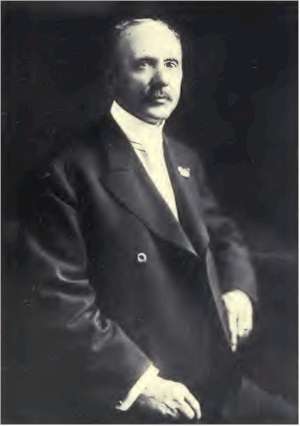
Cutler, John C.
John C. Cutler, second Governor of the State of Utah, was born
in Sheffield, England, February 5, 1846, at which time his
father was engaged as a manufacturer of cutlery, in Sheffield.
The early boyhood of the Governor was spent in the city referred
to, where he received the rudiments of a common school
education. At twelve years of age, with an earnest desire to be
self-supporting, he obtained a situation in the city of
Manchester, in the wholesale house of S. & J. Watts & Co., which
position he held until his eighteenth year, when he removed with
his parents from England, locating, in 1864, in Utah.
After landing in New York, the family went by boat to Albany,
thence by rail to St. Joseph, by boat up the Missouri River to a
place called Wyoming, near Nebraska City, and by ox team from
that place to Salt Lake City, arriving in the fall of the year
named. During the first year of their residence in Utah, the
boys of the family were engaged in the labor common to the time,
including canyon work, farm work, etc.
The Governor commenced his commercial career in Utah by
obtaining a clerkship in a business house. In 1877 he became
agent and later on manager of the Provo Woolen Mills, and in
1885 he and his brothers, Thomas R., Heber S., and Joseph G.,
formed the firm of Cutler Bros. Co., and he also assisted in the
establishing of beet sugar factories and other home
manufacturing enterprises of Salt Lake City. In various of these
companies he is still director.
Governor Cutler has always taken a lively interest in home
manufacture. He was one of the first to make knit goods in Utah,
a line of manufacture which his firm still follows with marked
success, and he is largely interested also in the beet sugar
industry. For years he was a director in the Deseret
Agricultural and Manufacturing Society, which conducts the great
State Fair each year with the aim of encouraging home
manufacture by bringing Utah products prominently before the
people. In these various capacities he is a large employer of
labor; and if anything can be said to be his hobby, it is giving
employment to home people and keeping money at home. He was also
for some years trustee and treasurer of the L. D. S. University.
In addition to his connection with the Cutler Bros. Company,
Governor Cutler is identified with the Utah-Idaho Sugar Company
and the Deseret National Bank. He is vice-president of the
Beneficial Life Insurance Company, director in the Home Fire
Insurance Company, Thatcher Bros. Banking Company, the Deseret
Savings Bank, the First National Bank of Murray, the Bank of
Randolph, Bank of Garland, the Utah County Light and Power
Company, and the American Security Company, and president of
Daynes Jewelry Company.
The Governor is a member of the Board of Governors of the
Commercial Club, and a member of the Alta Club, both of Salt
Lake City. He was married in 1871 to Miss Elizabeth Taylor, and
from the union seven children, four sons and three daughters,
have been born. Of the sons, John C., Jr., is a prominent stock
broker, Herbert E. is manager of Cutler Bros. Company, and
Alfred T. is assistant manager of that firm. Of the daughters,
Elizabeth is the wife of Edward E. Jenkins.
In politics, Governor Cutler has been an earnest Republican
since national party lines were formed in Utah. He has not been
a seeker after political office, on account of the close, urgent
attention required in his private business. Yet he has found
some time to give to public affairs. From 1884 till 1890 he was
clerk of Salt Lake County and ex-officio clerk of the Probate
Court. For a number of years he acted as United States Jury
Commissioner. In 1904 his friends prevailed on him to become a
candidate for the Republican nomination for Governor. Mindful of
the high honor involved in being chief executive of an important
State, he accepted the nomination and was elected in November,
1904.
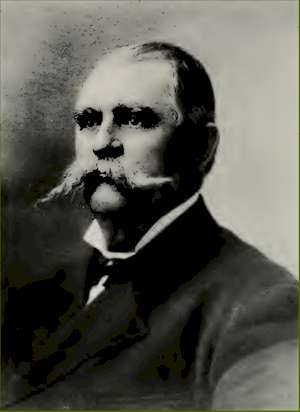
Cunningham, J. A.
The story of the rise of Utah from a desert to one of the
greatest wealth centers of the Union naturally involves an
account of numerous important citizens who have assisted in this
evolution process, and who have benefited themselves generously
while working out the destiny of the region. Such a person is
James A. Cunningham, one of the best known mining and business
men of Salt Lake City.
Mr. Cunningham was born at Quincy,
Illinois, on June 14, 1842. His father was a well-to-do farmer,
his mother was Lucinda Rawlins, of Bedford, Indiana. The
Cunningham family lived in Illinois until James was five years
old, then they removed to the State of Iowa. The elder
Cunningham took a large tract of farming territory located about
twenty miles above Council Bluffs, where the family lived until
the spring of 1848, when all faced the West on a long and
tedious wagon journey to Utah. This part of Mr. Cunningham's
life is indelibly impressed on his mind, although the party
passed across the plains and mountains without untoward
incident. Only once did the Indians interfere with progress, and
a liberal distribution among them of tobacco and foodstuffs
quickly secured safe passage through their lines.
Mr. Cunningham during his first few
years in the new territory followed farming, and afterwards
became a freighter in and out of Montana. Those were thrilling
days for the young man, but he passed through many adventures
none the worse for his experiences. In 1874 he turned his
attention to mining, buying a prominent interest in the Mammoth
Mine in the Eureka District of Utah. He served as president for
several years, and was vice-president and a director for twelve
years, and still is connected with this famous property. Up to
the past ten years, he had much to do with the active management
of the organization. To date the Mammoth Company has paid in
dividends the sum of $2,220,000.
Mr. Cunningham for three years was
president and manager of the Bullion Beck Mining Company,
another liberal dividend-payer of the State. In a less prominent
way, Mr. Cunningham has been identified with numerous successful
mining companies of the West, and for many years he was noted as
one of the big sheep men of the Western plains. At one 'time he
was the owner of 32,000 head of sheep, but when wool was placed
on the free list he began gradually to free himself from what
was proving to be a losing venture. Associated with his sons,
Mr. Cunningham is the owner of a 40,000-acre sugar plantation in
Mexico, where he spends half of his time each year. This
plantation is one of the most valuable in that republic.
By perseverance and hard work from
the early days, Mr. Cunning-ham has accumulated a fortune, and
is one of the wealthy men of Utah, yet one of the most
unassuming and approachable to be found any-where. He is filled
with the conviction, pounded into him by years of roughing it on
desert and mountain, of man's equality as far as he deserves
such consideration. He has a wide circle of friends throughout
the West and South who have learned to know him as a
healthy-brained, strong-willed and strong-muscled gentleman of
that fast dis-appearing type known as the old school. Mr.
Cunningham owns a beautiful home in Salt Lake City, where with
his family he is happy and content. He 'has five daughters and
two sons now living.
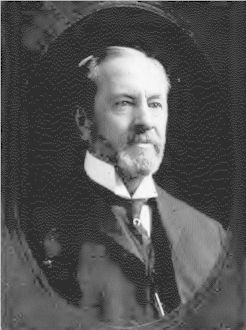
Cutler, Thomas
Thomas E.
Cutler, vice-president and general manager of the Utah-Idaho
Sugar Company and many other important enterprises through-out
the inter-mountain country, has been a resident of Salt Lake
City for nearly half a century, and during that period has
witnessed the marvelous growth of the city from a small town of
four thousand souls to the magnificent and wealthy city it is
to-day.
Mr. Cutler was born at Sheffield,
Yorkshire, England, June 2, 1844, and is a son of John and
Elizabeth Cutler. The elder Cutler was a steel manufacturer.
After receiving an ordinary common-school education, Thomas, at
the age of fifteen, entered the employ of S. & I. Watts & Co., a
mercantile house of Manchester, England. There he remained until
March, 1864, when he severed his connection and, with his
family, came to Utah and became a staunch supporter of the
Mormon faith. He was one of four brothers, three of whom are
still living, and prominent in Utah business circles. The family
arrived in Utah in the fall of 1864, and early in 1865 Thomas
secured employment with the T. & W. Taylor Mercantile Company,
of Lehi, where he remained for several years. He next engaged in
the cattle and sheep raising business and made considerable
money, with which he organized the People's Cooperative
Institution of Lehi, a successful business house which has
always paid dividends. He is still president of that progressive
institution, and was its manager till 1889, when he became
manager of the Utah Sugar Company, whose great success has been
due to his unusual business capacity.
In 1899 he organized the Lehi
Commercial and Savings Bank, of which he is still a director. He
is also a director in the Provo Woolen Mills, the most
successful enterprise of its kind in the Western country. He is
a director of the Cutler Brothers Company of Salt Lake City, and
interested in numerous mining ventures, industrial corporations,
financial institutions, etc., too numerous to mention. He is
vice-president of the Utah National Bank, director of the
Consolidated Wagon and Machine Company, which is one of the
largest in the world, president of the Continental Life
Insurance Company, and director in about a dozen banks
throughout the country. Mr. Cutler is a natural financier, a
good business man, generous to a fault, kindly and sympathetic.
He was married December 23, 1867, and is the father of an
interesting family of fifteen; namely, Emerette E., Thomas E.
Jr., Edith Laura, William Henry, Joseph A., Miranda, Luella,
Vera, Louis, Irma, Heber C., John F., Arthur, Ernest, and
Marion. The only political offices Mr. Cutler ever held were in
Lehi, where he lived for thirty-five years, and were of a local
nature. Mr. Cutler is a member of the Alta Club and of the
Commercial Club, and resides at 2000 South Fifth East Street,
Salt Lake City.

Index

Source: Sketches of the Inter-Mountain
States, Utah, Idaho and Nevada, Published by The Salt Lake
Tribune, Salt Lake City, Utah, 1909
|

